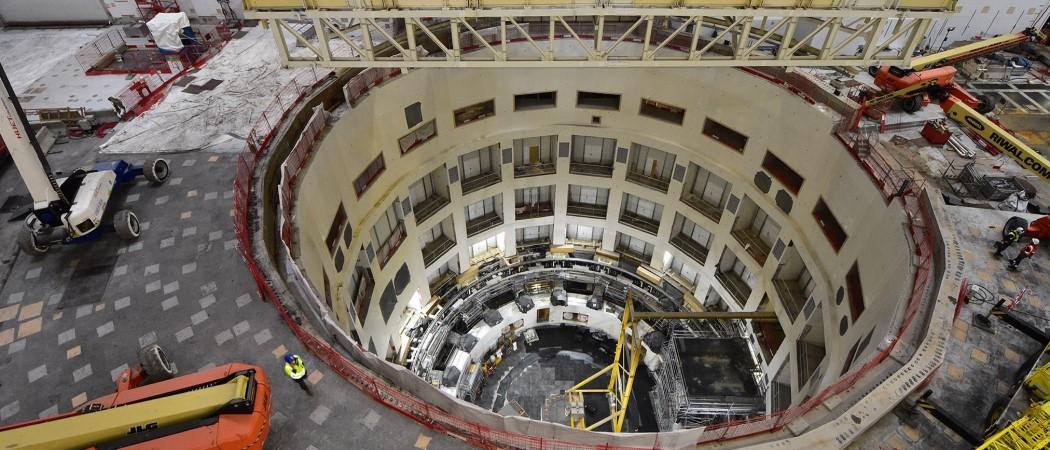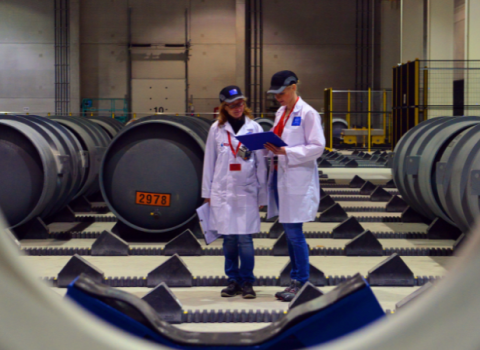New European Court of Auditors report finds there is a risk of further cost increases and delays to the ITER project. All other Horizon 2020 joint undertakings have ‘healthy’ financial management but some are behind schedule on implementation

Removal of the lid of the Tokamak pit, ready to receive its first machine component. Photo: ITER.
The EU could see its financial contribution to the International Thermonuclear Experimental Reactor (ITER) project going up at a time when a new report by the European Court of Auditors says there are weaknesses in procurement procedures, the management of its human resources and in project monitoring.
ITER is part of Fusion for Energy (F4E), the 35-year long public-private partnership set up to manage Europe’s contribution to the building of the pilot nuclear fusion reactor in southern France. “F4E’s weaknesses in procurement planning, as well as human resource and project management, place its operational effectiveness at risk,” the auditors say.
Nuclear fusion
Within the ITER project, the EU is coordinating the contribution of a 35 countries to the construction of the world's largest tokamak, a magnetic fusion device designed to provide proof of concept that nuclear fusion that powers the sun can be harnessed as a carbon-free source of energy.
Europe is paying 45.6 per cent of construction costs, of which 80 per cent is funded from the EU budget and 20 per cent by France as the ITER host country. The remainder is shared equally by China, India, Japan, Korea, Russia and the US (9.1 percent each).
After various delays, in November 2016, the ITER Council approved new timelines, putting the start of the operational phase back to 2025 and the completion of the construction phase to 2035. The previous estimate was that construction would be completed in 2020.
The EU’s contribution to the construction phase was revised to €12 billion euros (in 2008 prices), up from the €6.6 billion approved by the EU Council in 2010. However, these figures do not include the contingency of up to 24 months in terms of schedule, and 10-20 per cent in terms of budget, that the commission has recommended the project should have.
“While positive steps have been taken to improve the management and control of the JU’s contribution to the project construction phase, there remains a risk of further cost increases and delays in project implementation compared to the current approved baseline,” the auditors say.
The future of research partnerships
F4E is one a number of joint undertakings the EU established with industry in 2014 to carry out research in fusion energy, bio-based industries, clean air transport, fuel cells and hydrogen, medicines, air traffic management, electronic components and innovative rail solutions.
According to the audit, in 2019, the European Commission contributed around €1.9 billion to these research and innovation activities. The private partners include industry, various research groups, and international organisations that provide in-kind contributions.
The undertakings are slated to continue in some form alongside new partnerships on driverless cars, space and clean steel under the EU’s next research programme, Horizon Europe.
In their report published today, the auditors signed off the 2019 accounts of all joint undertakings. However, the auditors noted that while internal controls on payments were generally effective, several undertakings still had weaknesses in their procurement, grant payments and recruitment procedures.
“Our audit for 2019 confirms that their financial management is healthy, although several aspects can be further improved, for instance the management of procurements, grant payments and human resources,” said Ildikó Gáll-Pelcz, the member of the European Court of Auditors responsible for the audit.
The auditors also checked how much progress the joint undertakings have made to date. Some undertakings under Horizon 2020 fell short of targets, and on average only 51 per cent of Horizon 2020 and related activities had been implemented so far in the partnerships, which have a life span of 10 years, from 2014 to 2024.





 A unique international forum for public research organisations and companies to connect their external engagement with strategic interests around their R&D system.
A unique international forum for public research organisations and companies to connect their external engagement with strategic interests around their R&D system.